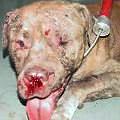|
作者:John Goodwin (美國人道協會調查人員)
美國東岸嘻哈猛將Jay-Z近來身價似乎有水漲船高的趨勢,除了有可能接任Def
Jam唱片公司的總裁之外,還成為Reebok代言人及名列美國40大青年首富,其“99
Problems”音樂錄影帶還贏得MTV音樂錄影帶大獎4個獎項。
但其音樂錄影帶內頌揚鬥狗此種不具正面社會價值意義的惡毒行為,可知Jay-Z也不過是另一位趕上這股暴力血腥風潮的饒舌歌手而已。

來自布魯克林區的饒舌歌手Jay-Z,自1996年出道以來,已接二連三的推出廣受大眾喜愛的熱門單曲,並成立了相當成功的Roc-a-Fella唱片公司和服裝品牌-Roca
Wear。他的魅力在他的全國巡迴演出更是無法阻擋,亦領位主演高成本的好萊鄔影片「黑街霸王」(Paid in Full)以及State
Property。
不論Jay-Z的其他用意為何,他的「99
Problems」這首歌,是不負責任的歌頌一種殘忍的非法行為──這種行為是對我們市內居民產生莫大的安全危機來源之一。
從某個角度來看,這只是歷史的翻版。數年前,歌手DMX坦承他以鬥狗冠軍犬為靈感,將唱片命名「雄偉冠軍Grand
Champion」。2002年,他在法庭中認罪,承認他虐待動物,並且未妥善照料他的13隻比特犬。
更令人髮指的是,一家大型唱片公司甚至推出一系列的「鬥狗專業用」狗食產品,並且在包裝印上一隻凶惡、壯碩的比特犬作為行銷手段。
當然,批評饒舌音樂英雄化幫派暴力、侮蔑女性等社會問題已不是一天兩天的事了。有些人甚至認為,鬥狗行為跟其他問題比起來,根本不值得一提。
但是,這種對動物殘忍的行為在全美50州都是非法的,想必有原因。仔細觀察後,我們會發現鬥狗跟嘻哈音樂中其他更常被批評的暴力行為是息息相關的。
某一個層次來看,把榮耀賦予這種不人道的虐待動物行為,代表的便是嘻哈音樂中犯罪要素對美國上百萬名樂迷的吸引力。

一隻比特犬在波士頓的鬥狗比賽中掛彩。〈圖片來源:波士頓市〉
然而,這些狗的死傷卻是事實。他們被當作鬥士,在相互攻擊、痛咬中彼此中廝殺。這些比賽可以持續數小時之久,而狗兒便在比賽中試圖把對方撕裂。
這個活動同時也會危害到居住在流行鬥狗區域中的居民。被打敗的、被認為不夠英勇的狗若不是直接一槍畢命,往往則是流落街頭。這些狗便馬上成為社區中的禍害。
觀察鬥狗行為,我們會發現那些狗往往都是被虐的,好讓牠們變得更兇猛而因此更具殺傷力。一但這些狗失去信任人類的本性,牠們將更容易視人為攻擊的對象,而伴隨這些攻擊事件通常都是不堪設想的後果。
有些替嘻哈音樂錄影帶中所呈現的暴力找理由的人,則認為這些畫面只是反映現實生活中的街頭文化。但是,鬥狗卻是在大眾文化的推動下所塑造的灰暗現實。
在嘻哈歌手英雄化凶狠的比特犬以及組織化鬥狗的同時,全國的鬥狗活動也明顯的增加,縱使州政府及聯邦政府正在執行許多相關的新法案。
我們亦須面對另一個事實:青少年往往會模仿偶像的行為。堅持透過自己的音樂使得這些影像傳遍全國的藝人,必須接受他們自己正在推廣社區暴力的事實。
嘻哈樂界中,正義之聲到底在哪裡,以譴責鬥狗,以及鬥狗對動物及大社會所帶來的傷害的?現在我們需要聽到的是這類的藝人,而不是Jay-Z,的聲音。
|
|
By John Goodwin
October 13, 2004
Hip-hop mogul Jay-Z looks to be on top these days, with
a potential deal to become president of Def Jam Recordings, a Reebok
lifestyle line, a place on Fortune's list of the wealthiest 40 Americans
under 40, and a music video, "99 Problems," that recently earned four
MTV awards, including rap video of the year.
But with his video's celebration of dog fighting, a
vicious pursuit with no positive social value, Jay- Z's just another
rapper caught up in the blood rapture.

A rapper from Brooklyn, Jay-Z has had a string of hits
from 1996 that he spun into a successful record label Roc-a-Fella, a
lucrative clothing line, Roca Wear; arena-jamming cross-country tours;
and big-budget Hollywood films (Paid in Full, State Property). (Photo
credit unknown)
Whatever else he intends, Jay-Z's "99 Problems" offers
an irresponsible tribute to a cruel and illegal practice that represents
one of the most serious threats to the safety of our inner city
residents.
In some ways, it's just a bad remix. A few years ago,
DMX admitted that he named his album "Grand Champion" in homage to
top-notch fighting dogs, and in 2002 he pled guilty to animal cruelty
for having 13 neglected pit bulls in his possession.
Shamefully, one major record label has even gone so far
as to market its own line of dog food - "Game Dog Professional" -
complete with a picture of a well-muscled, fearsome pit bull on the bag.
Of course, there's nothing new about criticizing rap
music for glamorizing gang violence, the mistreatment of women and other
social evils, and some might say that dog fighting is undeserving of
mention within this constellation of ills.
But it's a form of animal cruelty that's illegal in all
50 states for a reason. A closer look reveals its crucial links to the
more common forms of violence and misconduct deplored by hip-hop's
critics.
At one level, the glorification of this gratuitously
cruel form of animal abuse serves as simply one more symbolic marker of
hip-hop’s outlaw appeal for the millions of Americans who listen to the
music.

A pit bull is bloodied in a dog fight in Boston (Photo
courtesy City of Boston)
But the dogs die for real. They are pitted against one
another as gladiators in bloody contests where they attack and bite with
crushing strength. These fights can go for hours as the dogs literally
tear each other apart.
Dog fighting also threatens the lives of the human
residents in every community where it thrives. If they aren't shot
outright, losing dogs that fail to show "gameness" are released on the
streets to fend for themselves. These dogs become an immediate menace to
all who encounter them.
A look at pit-bull mauling cases shows that most involve
dogs abused in order to make them "mean," and hence, better fighters.
Once these dogs lose their natural inclination to see people as friends,
they are more prone to attack, often with horrible results.
Some apologists for the violence in hip-hop videos argue
that the imagery only reflects the harsh truth of the streets. But in
this case, pop culture has helped to structure a grim reality.
The glorification of fierce pit bulls and organized dog
fighting by hip-hop artists coincides with a dramatic increase in dog
fighting nationwide, despite a spate of newly enacted state and federal
laws.
And there's another reality to confront. Young people
often mirror the actions of the celebrities they idolize. Artists who
insist on spreading these images through their work must accept their
roles in perpetuating community violence. Where are the compassionate
voices within the hip-hop world, those who despise dog fighting and the
harm it brings to both the animals and the greater community? It's these
artists, and not Jay-Z, who now need to be heard.
|
